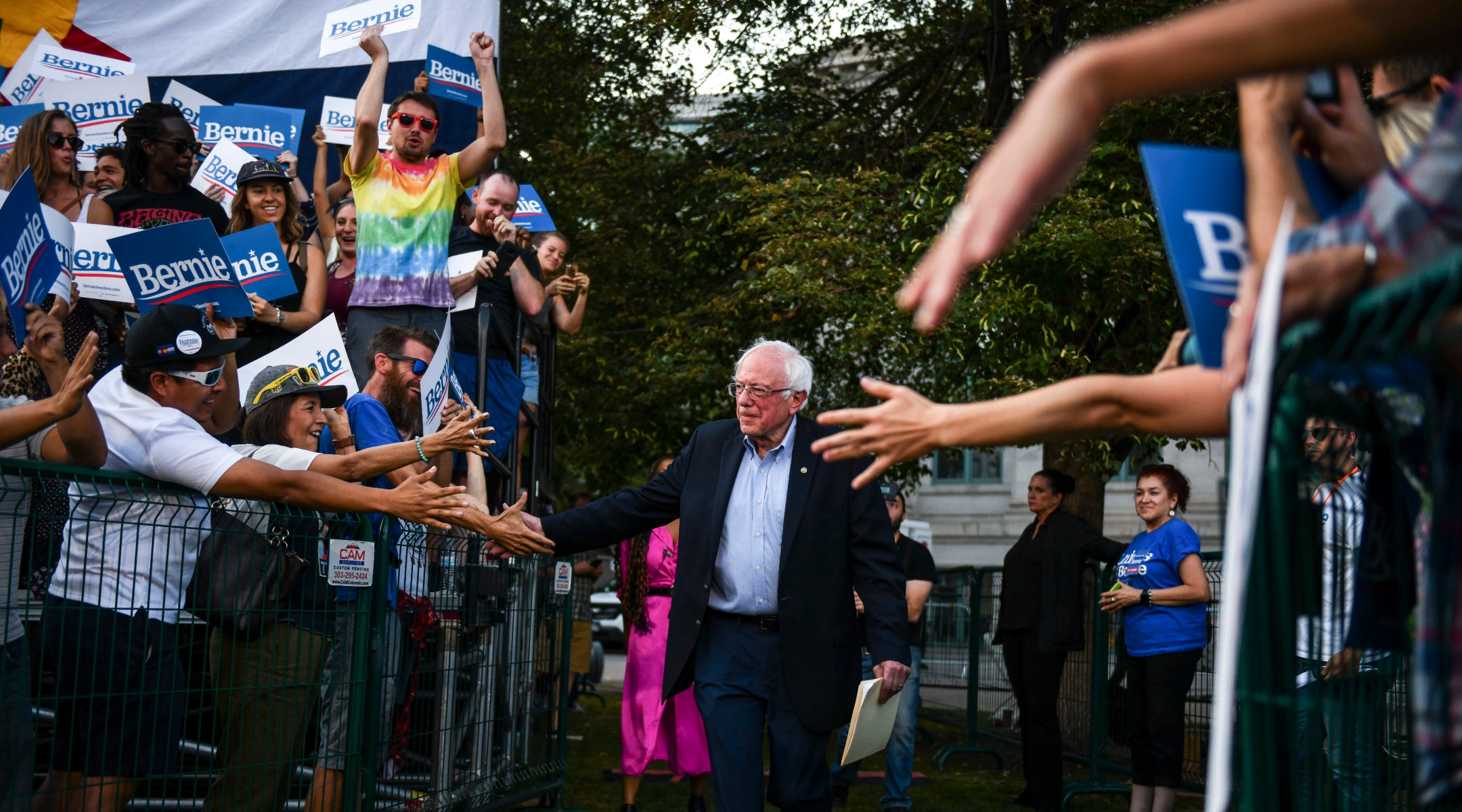NEW YORK (JTA) — Ahead of the Democratic presidential debate on Tuesday, there has been plenty of discussion of Sen. Bernie Sanders: how he will fare after his recent heart attack, whether he can come back in polls that show him drifting into third place behind Joe Biden and Sen. Elizabeth Warren and how his campaign’s new emphasis on electability against Trump will fare with voters.
Less discussed is the fact that Bernie Sanders epitomizes what it means to be an American Jew in 2019.
For Sanders’ critics, this idea almost seems laughable. A Morning Consult survey of American Jews in May found that 47 percent supported Biden, the former vice president, compared to just 11 percent for Sanders. (Granted, Sanders still placed second in the poll, and Biden’s national poll numbers have substantially dipped over the past few months while Warren’s have ascended.)
The reason, a chorus of Jewish commentators allege, comes down to some variation of Sanders being “a Jew in name only,” as the conservative pundit Ben Shapiro put it in 2016.
The Forward’s opinion editor, Batya Ungar-Sargon, summed up the familiar arguments in a recent op-ed.
“Sanders isn’t religious,” she wrote, “he doesn’t have any close ties to institutional American Judaism, and has long had a reputation for being cagey about discussing his Jewish identity.”
It is certainly true that Sanders is far from the mold of the last Jewish candidate on a presidential ticket, Joe Lieberman. An observant, die-hard Israel supporter, Lieberman fit the mold of institutional American Judaism familiar to those raised in Jewish day schools and summer camps.
But to say that Sanders does not tell a “Jewish story” is to miss the messy, contradictory and polarized nature of American Jewry today. For as much as Sanders seems alien to many of the shul-going, institutionally affiliated older Jewish Americans, he is deeply representative of the silent majority for whom social justice movements take the place of synagogue and Israel is more often a cause for kvetching than kvelling.
Though he is 78 years old, Bernie Sanders represents the future — and increasingly, the present — of American Jewry.
Even as American Jews remain fairly united in opposition to Donald Trump (only 24 percent voted for him in 2016), we disagree sharply on much everything else. According to survey data from Pew and the American Jewish Committee, 44 percent of Jewish Americans say religion is not important in their lives and 59 percent consider being Jewish “mostly a matter of ethnicity or culture.”
Then there’s Israel. Sanders has insisted that he is a supporter of the Jewish state, describing himself as “100 percent pro-Israel,” but a critical one: He said in 2016 that “if we pursue justice and peace, we are going to have to say that Netanyahu is not right all of the time.” Earlier this year, the longtime senator proposed leveraging U.S. aid to push Israel to change some of its policies.
A majority of Jewish Americans share this outlook: 59 percent describe themselves as pro-Israel but critical of some or all of the current Israeli government’s policies. Six years ago, half of American Jews thought Israel should dismantle at least some West Bank settlements; that share is now at two-thirds, according to Pew Research.
From 2013 to 2018, the share of Jews who identify as politically liberal has jumped from 49 percent to 64 percent, according to data from Pew Research. While in 2013 Sanders was part of the 36 percent of Jews who did not identify with a particular denomination, now he is in the company of 44 percent of our community.
That’s particularly true with Jewish youth, who are less religious, more liberal and more critical of Israel than our older co-religionists. Among Jews who’ve been married in the past 25 years, it’s more common than not to marry a non-Jew, as Sanders himself did.
For Jewish millennials like me, it is refreshing to have a presidential candidate like Sanders who, as David Klion has written in Jewish Currents, expresses his “Jewishness,” an ethnic and cultural identity rooted in family history and present life here in America, rather than just Judaism, a religion, or Zionism, a political ideology. In a time of rising, violent anti-Semitism in the United States and increasing discontent with the policies of Israel, Sanders speaks to the contemporary Jewish moment with his call for “war with nationalism and racism in every aspect of our lives.”
“My father’s whole family was wiped out by Hitler and his white nationalism,” Sanders said at the Young Leaders Conference in Atlanta earlier this year. “Too many people have fought over the years, too many people have died against racism to let it resurface and flourish in America.”
I once was a committed Zionist who attended Jewish day school. As a young kid, I remember my pride in helping my dad put up a Gore-Lieberman campaign poster. But like many of my peers, I became alienated with the injustices I saw political elites perpetrate in the U.S. and Israel, and American Jewish organizations’ unwillingness to challenge them. Now, as a mostly secular democratic socialist, I’m glad to have a presidential candidate who is not just Jewish, but Jewish like me. And, increasingly, Jewish like most of us.
JTA has documented Jewish history in real-time for over a century. Keep our journalism strong by joining us in supporting independent, award-winning reporting.







